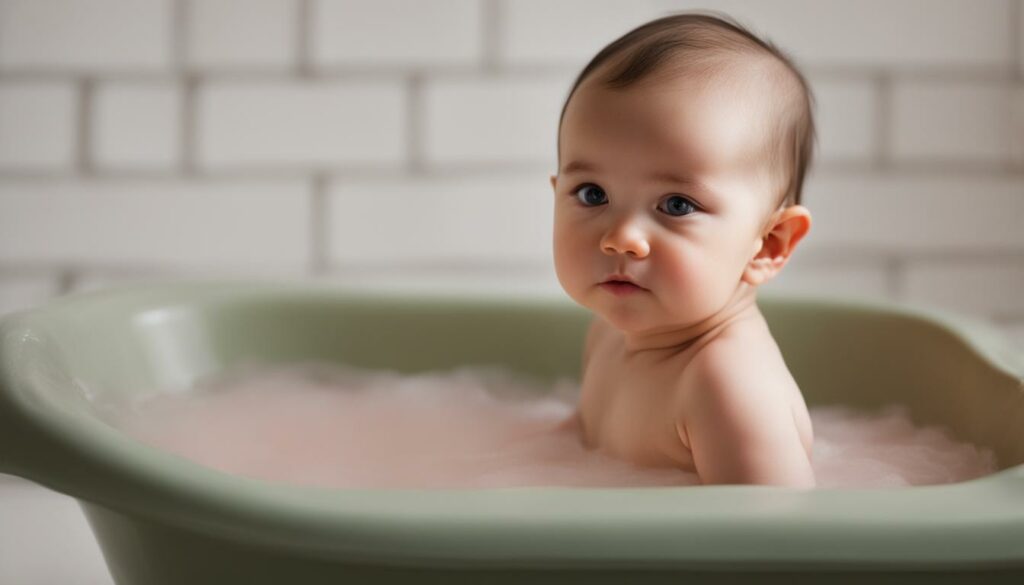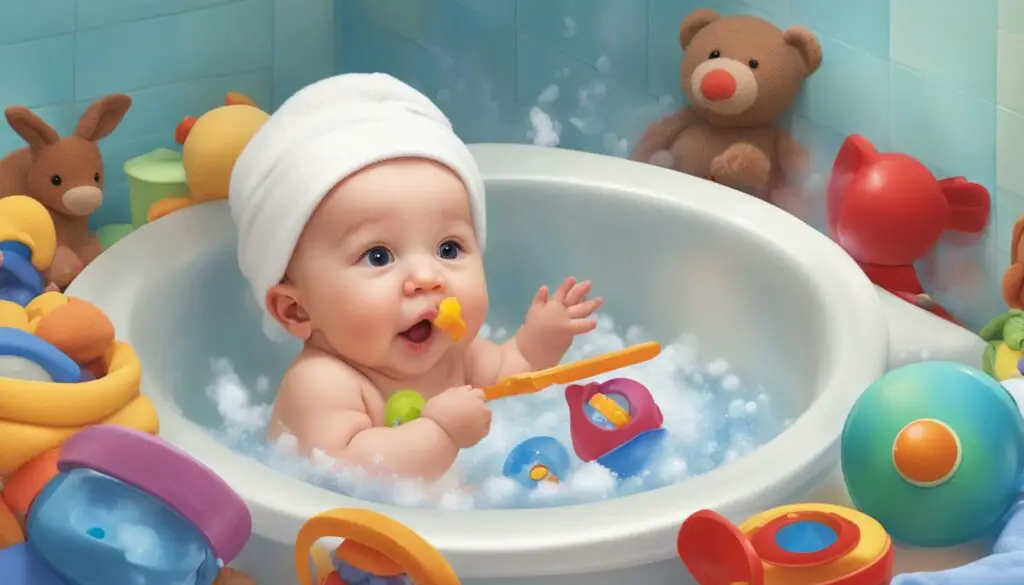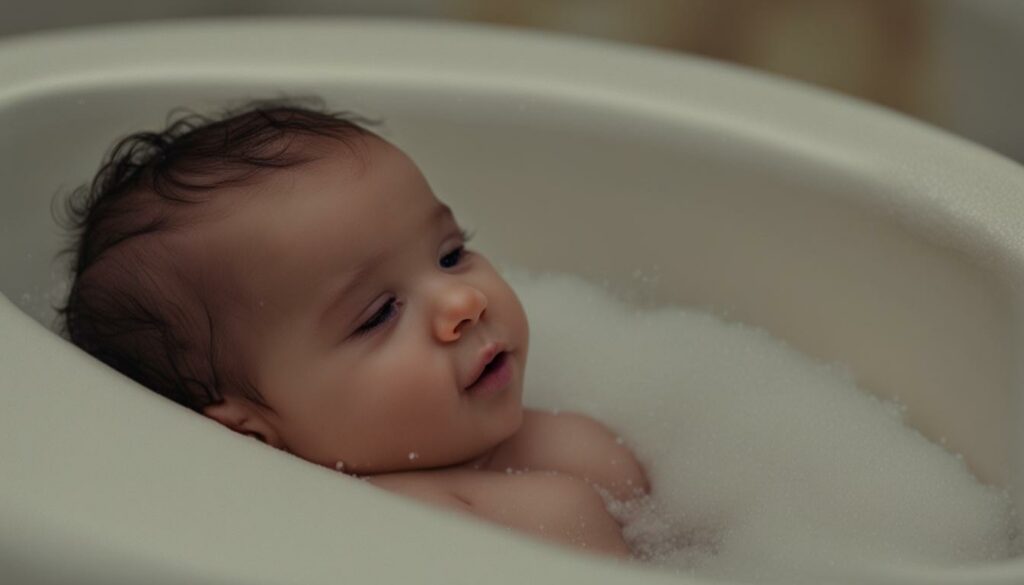As a new mom, you may be wondering when it’s appropriate to start bathing your baby daily. It’s essential to navigate the world of baby bath time to ensure that your little one stays clean and comfortable without compromising their sensitive skin.
With so much information out there, it can be overwhelming to determine the right time to start bathing your baby daily. That’s why we’ve prepared this comprehensive guide to provide essential tips for new moms.
From understanding your baby’s sensitive skin to establishing a bath time routine and selecting the right products, we’ve got you covered. Let’s dive in!

Key Takeaways:
- Starting to bathe your baby daily depends on various factors, such as their age and skin sensitivity.
- During the newborn stage, gentle cleansing and sponge baths are appropriate instead of daily bathing.
- As your baby grows, you can transition to more frequent baths while maintaining proper hygiene and using gentle skincare products.
- Establishing a bath time routine is crucial for promoting consistency and comfort.
- Choosing the right products for your baby’s sensitive skin is essential.
Understanding Baby’s Sensitive Skin
Before diving into the topic of bathing your baby daily, it’s crucial to understand the unique nature of your baby’s sensitive skin. Unlike adult skin, baby skin is delicate and susceptible to damage, making it essential to practice gentle care.
“Because infant skin is more permeable than adult skin, it can be more sensitive to irritants and more susceptible to dryness, making babies more prone to rashes and other skin conditions.”
According to the American Academy of Dermatology, a baby’s skin is thinner than that of an adult and has fewer oil glands, making it more prone to dryness, irritation, and damage. Additionally, frequent bathing can strip the skin of its natural oils, leading to dryness and exacerbating skin conditions.
Therefore, it’s essential to use gentle soaps and skincare products designed for babies and avoid harsh chemicals that can irritate their skin.
When bathing your baby, use lukewarm water and avoid hot water, which can further dry out their skin. Limit baths to no more than ten minutes and pat your baby dry with a soft towel, avoiding rubbing that can cause irritation.
Finally, pay attention to your baby’s skin and notice any changes such as redness, dryness, or rashes. Consult your pediatrician if you’re concerned about your baby’s skin.
The Newborn Stage: Gentle Cleansing and Sponge Baths
During the first few weeks, small and frequent sponge baths (once or twice a week) using warm water, a soft washcloth, and a mild baby soap are enough to keep your newborn clean and comfortable. Using a bath tub or sink is not recommended until their umbilical cord stump has fallen off and the area has healed completely.
Here are some steps you can follow to ensure proper hygiene and skin care for your newborn:
- Before giving your baby a sponge bath, make sure you have all the necessary items within reach, including a clean diaper, clean clothes, mild baby soap, and a soft washcloth.
- Fill a clean basin or sink with warm water (around 100°F or 38°C) and test it with your elbow or wrist to ensure it’s not too hot for your baby.
- Undress your baby and wrap them in a towel or blanket, leaving only the areas you’re washing exposed.
- Dampen the washcloth with water and add a small amount of baby soap to it. Lather the soap and gently clean your baby’s face, neck, and ears with the washcloth. Avoid getting soap and water in their eyes and mouth.
- Use a clean cloth to rinse off the soap and water, and dry your baby with a towel or blanket.
- After cleaning the face and neck, move on to the rest of the body, including the diaper area, arms, legs, and chest. Make sure to clean all the folds and creases, but avoid scrubbing or rubbing too hard, as this can irritate their delicate skin.
- Rinse your baby off with a clean, damp washcloth and wrap them in a dry towel or blanket.
- Once you’ve finished cleaning, put a fresh diaper on your baby and dress them in clean clothes.
Because newborns’ skin is delicate and sensitive, it’s essential to choose gentle skincare products that won’t irritate or dry out their skin. Look for baby soaps and shampoos that are fragrance-free, hypoallergenic, and designed specifically for newborns.
Remember that babies don’t get very dirty, and over-bathing can actually harm their skin by stripping away its natural oils and causing dryness and irritation. Stick to sponge baths until your baby is ready for more frequent bathing.
Keeping your newborn clean and comfortable is crucial for their health and well-being. By following these gentle cleansing and sponge bath tips, you’ll be able to provide the care your baby needs while keeping their sensitive skin in mind.
Transitioning to More Frequent Baths: The Infant Stage.
As your baby enters the infant stage, usually around 4-6 months of age, and their skin becomes less sensitive, you may begin to transition to more frequent baths. However, it’s still essential to maintain gentle care and avoid using harsh soaps or scrubbing too roughly during bath time.
During this stage, daily baths are not necessary unless your baby gets particularly dirty. Instead, aim for a bath every 2-3 days, ensuring that you clean all the folds of their skin thoroughly to prevent any irritation or infection.
Avoid overusing skincare products or exposing your baby to hot water, which can dry out their delicate skin. Stick to lukewarm water and select baby-friendly soap and shampoo options that are hypoallergenic and free of added fragrances.
Remember to always supervise your baby during bath time and keep all bath time essentials within reach to avoid any accidents or slips.
Infant Bath Time Tips:
- Follow a routine to help your baby know what to expect during bath time.
- Ensure the water temperature is comfortable for your baby by testing with your elbow or a thermometer.
- Keep a firm grip on your baby at all times to prevent any slipping and sliding.
- Prioritize cleaning the diaper area and folds of skin to avoid any rashes or irritation.
- Pat your baby dry with a soft towel instead of rubbing to avoid any skin damage.
Transitioning to more frequent baths during the infant stage is an exciting milestone for both you and your baby. By sticking to gentle care and following these essential tips for daily hygiene and skin care, you can ensure that your baby’s delicate skin remains healthy and protected.
The Introduction of Solids: Dealing with Increased Dirtiness
Introducing solids to your baby’s diet is an exciting milestone in their development, but it also means they’ll likely get messier during meals. As your little one becomes more adventurous with their eating, you may find yourself needing to bathe them more frequently to keep up with the increased dirtiness.
To maintain proper hygiene, it’s important to clean your baby’s face and hands after every meal. You can use a gentle cleanser or a damp washcloth to wipe away any excess food. For messier meals, such as when your baby is learning to eat with a spoon, consider using a bib to protect their clothes and make mealtime cleanup easier.
The American Academy of Pediatrics recommends bathing your baby two to three times a week during the first year, so daily baths may not be necessary unless they are particularly messy or have sensitive skin. However, it’s always best to consult with your pediatrician if you have any concerns about your baby’s hygiene or skin care needs.

When bathing your baby after a messy meal, be sure to use a mild, tear-free baby shampoo and avoid harsh soaps or fragrances that could irritate their sensitive skin. Pay extra attention to their folds and creases, where leftover food can hide and cause irritation.
As your baby continues to grow and explore new foods, daily baths may become a regular part of your routine. Keeping up with their increased dirtiness will help prevent skin irritation and keep your little one clean and healthy.
Sweating and Baby’s Skin: Managing Perspiration
As your baby becomes more active, they may sweat, leading to increased dirtiness and the need for daily baths. However, it’s essential to remember that baby’s skin is sensitive and requires gentle care even when sweating.
Sweat can irritate baby’s skin, leading to rashes and discomfort. To manage perspiration, ensure your baby’s clothing is loose-fitting and made of breathable materials like cotton.
When it comes to bath time, use lukewarm water and a mild, fragrance-free soap to avoid further irritating their sensitive skin. Be sure to rinse well and pat your baby’s skin dry, avoiding any rubbing or harsh scrubbing.
Additionally, be mindful of the products you use on your baby’s skin after bath time. Choose gentle, moisturizing lotions free of fragrances and harsh chemicals that can further irritate their sensitive skin.
By taking these steps, you can help manage your baby’s perspiration and keep their sensitive skin healthy and comfortable.
The Toddler Phase: Encouraging Independence and Hygiene
As your baby grows into a curious and independent toddler, daily baths become an important aspect of their hygiene routine. Toddlers tend to be more active, exploring their surroundings, and getting into all sorts of messes. Therefore, daily bathing helps keep them clean and healthy.
It’s essential to maintain gentle skincare products to protect your toddler’s sensitive skin. You can now use mild, soap-free cleansers suitable for toddlers’ skin. Choose products that are hypoallergenic, fragrance-free, and free of harsh chemicals to prevent any skin irritation. Remember to always test the product on a small area of their skin before using it for the first time.
Encouraging good hygiene habits during this phase is also fundamental. Teach your toddler how to wash themselves and make it a fun activity. You can add bath toys, water play, and even songs to make bath time an enjoyable experience. However, always supervise your toddler while they are in the bathtub to prevent accidents and ensure their safety.
The Benefits of Daily Bathing for Toddlers
Regular bathing helps prevent skin infections, rashes, and other skin conditions that can be uncomfortable for your toddler. Daily baths can also promote relaxation and better sleep, which is crucial for their overall well-being.
During the summer months, your toddler may sweat more, and daily baths become even more important. Sweating can lead to bacterial growth and some skin infections like diaper rash. Daily baths help prevent these issues, keeping your toddler’s skin clean and healthy.
Fun Activities for Bath Time
Bath time is a great opportunity to bond with your toddler and make it an enjoyable experience. Here are some fun activities you can try:
- Bath toys: Add some rubber ducks, boats, and other toys to make bath time fun and exciting.
- Water play: Allow your toddler to splash around and play with water. It can also help your toddler develop their fine motor skills.
- Songs and storytelling: Sing songs or tell stories to entertain your toddler while they are getting clean.
Remember, safety is essential during bath time. Always supervise your toddler and never leave them alone in the bathtub, even for a second. Always ensure the water temperature is comfortable and not too hot or cold. A good rule of thumb is to test the water with your elbow or wrist before placing your toddler in the bathtub.
Establishing a Bath Time Routine for Daily Hygiene
Creating a bath time routine for your baby is crucial to establish daily hygiene. A good routine helps your baby feel safe, relaxed, and comfortable, making bath time a fun and enjoyable experience.
When setting up your bath time routine, there are a few things to keep in mind:
- Choose a time that works for you and your baby. Whether it’s in the morning or at night, select a time that fits your schedule and allows you to devote uninterrupted attention to your little one.
- Ensure you have all the necessary items within reach, such as baby shampoo, soap, washcloths, and towels. This prevents you from leaving your baby unattended and ensures a smooth and stress-free bathing experience.
- Set the scene for relaxation and playfulness. A calm and soothing environment helps your baby feel secure, while toys and bubbles can make bath time fun and engaging.
Remember, every baby is unique, and your bath time routine should be tailored to suit your baby’s preferences and needs. An established routine also helps your baby understand what to expect, promoting consistency, and comfort.
Pro Tip: Don’t panic if your baby cries during the first few baths. This is normal, and it may take some time for your baby to get used to the experience. Comfort and soothe your baby by speaking softly and maintaining eye contact, and stop the bath if your baby becomes too upset. Try again in a few days.
By establishing a bath time routine, you can guarantee your baby’s daily hygiene needs are met while also creating a bonding experience with your little one. Remember to always prioritize your baby’s comfort and safety, and enjoy this special time together.
Choosing the Right Products for Your Baby’s Skin
When it comes to bathing your baby daily, choosing the right skincare products is crucial to ensure their sensitive skin remains healthy and protected. Here are some essential tips to keep in mind:
- Gentle ingredients: Look for products that are free of harsh chemicals, fragrances, and dyes that can irritate your baby’s skin. Opt for gentle, hypoallergenic, and non-toxic formulas made specifically for babies.
- Skin type: Consider your baby’s skin type when choosing skincare products. If your baby has dry skin, look for products that provide hydration, such as baby oil or cream. If your baby has sensitive skin, look for products that are labeled as such.
- Product safety: Ensure that the products you choose are safe for your baby to use. Check the labels for any warnings or precautions, and always consult with your pediatrician before trying any new products.
When it comes to bathing your baby, less is more. Stick to using gentle and suitable skincare products to avoid irritating your baby’s sensitive skin. Remember to always do a patch test before using any new product on your baby’s skin.

Additional Tips for Bathing Baby Daily
Here are some additional tips to remember when bathing your baby daily:
- Use mild and fragrance-free soap to prevent skin irritation. Apply a small amount to your hands and lather it to your baby’s body using gentle motions. Rinse thoroughly with warm water.
- Make sure the room temperature is warm enough for your baby. The water should be around 100°F to 120°F. Test the water with your elbow or a thermometer to ensure it’s not too hot.
- Keep all bath essentials within your reach to avoid leaving your baby unattended. This includes towels, washcloths, soap, and shampoo.
- Opt for a baby bathtub or sink insert to make bath time more comfortable and safe for your baby. Always support their head and neck and keep a hand on them at all times.
- Don’t use cotton swabs or any other objects to clean inside your baby’s ears or nose. This can lead to potential injury or infection. Instead, use a clean washcloth to gently clean the outer areas of their ears and nose.
- Use a soft-bristled brush to gently massage your baby’s scalp to prevent cradle cap. This can be done every few days and doesn’t require daily shampooing.
- After bath time, pat your baby dry with a soft towel and apply a gentle moisturizer to keep their skin hydrated. Avoid using lotions or oils that contain harsh chemicals or fragrances.
By following these additional tips, you can make bath time a pleasant and healthy experience for your baby.
Conclusion
Bathing your baby daily is an essential aspect of their hygiene and skin care routine. By understanding your baby’s skin sensitivity, developmental milestones, and daily activities, you can make informed decisions about when and how often to bathe them.
During the newborn stage, gentle cleansing and sponge baths are suitable. As your baby grows into the infant stage, more frequent baths may be necessary, but you should still prioritize gentle skincare products that are suitable for their sensitive skin.
When your baby starts eating solids, you may need to increase the frequency of their baths to manage increased dirtiness. Also, as your baby becomes more active, sweating can occur, and you may need to bathe them daily to manage perspiration.
As your baby becomes a toddler, encourage their independence and hygiene by establishing a bath time routine that works for both you and your little one. Choose suitable skincare products for your baby and seek additional tips and tricks to make the entire process enjoyable and comfortable for both of you.
Remember:
Bathing your baby daily is an individual choice that depends on various factors. However, it’s crucial to prioritize their hygiene and skin care needs to keep them healthy and happy. By following the essential tips provided in this guide, you can make informed decisions about when and how often to bathe your baby, ensuring their hygiene and skin care needs are met with love and care.



